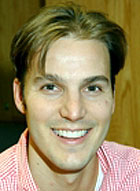Current treatments allow most HIV-infected individuals to live healthy, productive lives, but they can also increase risk for cardiovascular problems. Now School of Medicine researchers have found a possible explanation. They discovered that the heart doesn’t slow down as quickly after exercise in patients taking highly active antiretroviral therapy (HAART) for HIV.
The research, led by W. Todd Cade, Ph.D., assistant professor of physical therapy and of medicine, studied HIV-positive people receiving HAART therapy. All had good immune function and very low or even nondetectable levels of the virus in their blood.

The researchers had study participants exercise on stationary bikes until they attained peak heart rate. Then they measured how quickly their hearts returned to resting rates compared with people of the same age and activity level who were not infected with HIV.
“In the general population, heart rate recovery following peak exercise is a very strong predictor of future cardiovascular disease and death,” Cade said. “So we think we may have identified a mechanism that contributes to increased risk for cardiovascular disease and heart attacks in HIV-positive individ-uals.”
The better a person’s fitness level, the quicker their heart rate will return to baseline levels. People with congestive heart failure, diabetes and other problems not necessarily related to HIV have impaired heart rate recovery.
“This study is the first to demonstrate that heart rate recovery is impaired in HIV-infected people, whether they have metabolic problems or not,” Cade said.
About half of those with HIV who take HAART therapy eventually develop metabolic complications such as insulin resistance or abnormal cholesterol and triglycerides. Those are risk factors for heart disease.
Cade and colleagues assumed that particular antiviral drugs called protease inhibitors might exacerbate that problem, but they found that wasn’t the case. Instead all HIV-positive people on HAART therapy had a slower heart rate recovery, regardless of whether they also took protease inhibitors.
Cade said he believes both HIV status and HAART therapy probably play roles in the observed changes in heart rate recovery. Because HIV-positive participants in the study were healthy, Cade said the finding means changes are taking place in the autonomic nervous system, which controls heart rate and heart rate recovery, even before metabolic abnormalities can be detected.
As evidence mounts that HAART therapy may have long-term complications, Cade said it is important to remember that without such therapy, many HIV-infected people would be dying from AIDS.
“HIV has become a chronic, manageable disease, and HAART therapy is helping people live another 20-30 years or longer,” he said. “Now that we know it impairs heart rate recovery, we want to see if those problems can be delayed or reversed.”
Cade is studying whether a four-month exercise-training program or treatment with a diabetes drug might improve heart rate recovery and delay some of cardiovascular problems that currently affect HIV-infected patients.
His latest findings were reported in the journal HIV Medicine.